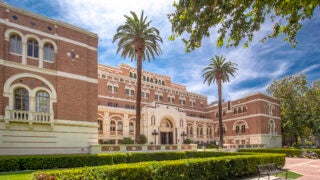Cancer registry managed by Keck School of Medicine of USC receives $43.7 million award

The Los Angeles Cancer Surveillance Program has improved the understanding, prevention and control of cancer for nearly 50 years.
Contact: Gary Polakovic, (323) 527-7770‬ or polakovi@usc.edu
The National Cancer Institute has awarded Keck School of Medicine of USC and USC Norris Comprehensive Cancer Center $43.7 million to continue tracking all incidences of cancer in Los Angeles County.
Called the Los Angeles Cancer Surveillance Program, the registry dates back nearly half a century and has improved the understanding, prevention and control of cancer, a disease that is among the leading causes of death worldwide.
“We are the first line of defense: We identify cancer trends and pave roads that lead to better cancer prevention and treatment,” said Dennis Deapen, director of the Los Angeles Cancer Surveillance Program and a professor of clinical preventive medicine at the Keck School of Medicine.
“Without people like us collecting cancer data from a large, diverse population, cancer research primarily would be based on old, white men. That isn’t very useful for other ethnic and age groups because they have different genetic and environmental risk factors.”
The promised $43.7 million from the NCI’s Surveillance, Epidemiology and End Results (SEER) Program will be spread over 10 years and support cancer data collection.
Nationwide, there are only 19 SEER registries that provide the federal government with ongoing surveillance of cancer incidence and survival rates in the United States. The Cancer Surveillance Program, managed by the Keck School of Medicine and USC Norris Comprehensive Cancer Center, is one of the largest and arguably the most comprehensive cancer registry in the United States. It contains more than 1.7 million cancer incidence cases and collects some 44,160 records annually.
Founded in 1970, the Cancer Surveillance Program is unique in that it surveys one of the most diverse counties in the nation. Los Angeles County has a population large enough to enable identification of significant trends even when data are segmented into ethnic, socio-economic, age and other subgroups.
Diversity in health research
Los Angeles County has 10,163,507 people — 26 percent of California’s population, according to the U.S. Census Bureau. While there are counties in the United States that are slightly more diverse, some of their populations are not large enough to draw significant findings when broken into subgroups.
“Our registry contributes to the expansion of data that supports precision medicine or personalized medicine,” Deapen said. “We are identifying the risk level, survival chance or effectiveness of cancer control programs and efforts for specific groups of people.”
More than 6,000 international scientific studies have used data from the Cancer Surveillance Program, suggesting its expansive reach when it comes to defining demographic patterns and risk factors for specific cancers.
The surveillance program was the most cited SEER cancer registry in 2015, according to the most recent data available. Some trends the program has highlighted in past cancer report cards include:
- Black men had the highest overall cancer rates and, on average, were twice as likely to be diagnosed with the disease when compared to most Asian subgroups. Blacks have the highest risk of developing the following cancers: prostate, pancreas, kidney, multiple myeloma, esophagus and larynx.
- Breast cancer, followed by colorectal cancer, are the most common cancers among women. In recent years, breast cancer has declined or plateaued, except among Korean women, who are experiencing an increase.
- Colorectal cancer is on the rise among 15- to 39-year-olds even though the disease is on the decline for older populations. More sedentary lifestyles and poor diet may be a contributing factor
USC improves precision medicine, especially for minorities
The Keck School of Medicine is in a unique position to increase the diversity in health research by drawing from the demographic diversity that encircles it.
Earlier this month, the National Institutes of Health announced that Keck School of Medicine and nationwide partners were awarded a landmark $1.5 billion over 10 years to accelerate the development of precision medicine. The project, called the All of Us Research Program, will collect the health data of a demographically, geographically and medically diverse community of participants.
Two years ago, Keck School of Medicine hired two trailblazers in genomics and precision medicine. John D. Carpten and David W. Craig developed the Department of Translational Genomics and Institute of Translational Genomics. The pair also built a state-of-the-art gene sequencing lab called the Keck Genomics Platform. Among other things, the lab will help scientists understand what effect genetic ancestry has in disease risk and treatment.
All told, a one-size-fits-all approach is not effective when it comes to health research and treatment. Given the significant diversity available in Los Angeles, the Keck School of Medicine of USC is a leader in recruiting more minorities into clinical studies to find effective, personalized treatment for everyone.



